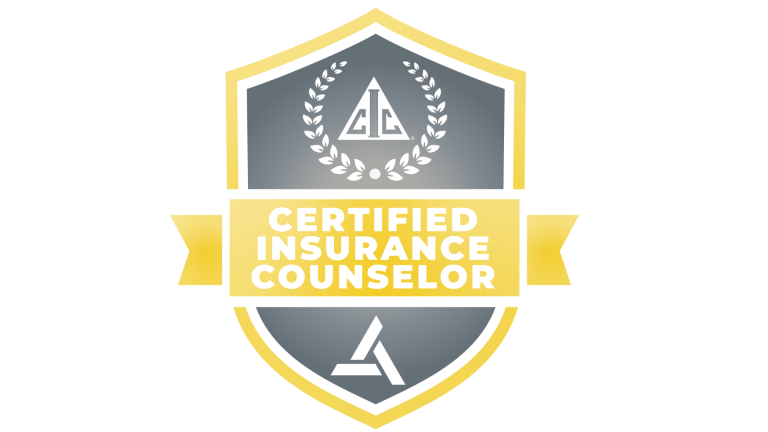
Certified Insurance Counselors (CIC) are recognized for their expertise and commitment to the industry.
"The Insurance Professional's Designation®"
The Certified Insurance Counselor program is nationally recognized and highly respected insurance professional designation for agency owners, producers, agents, CSR’s, brokers, and insurance company personnel.
This designation is recommended for:
- Licensed agents, brokers, and adjusters
- Insurance professionals with at least two years of full-time insurance or risk management experience
- Full-time insurance faculty members who have taught for at least two years at an accredited college or university
Earning the Designation
CIC Courses
Learn the fundamentals of strategic planning within an agency and learn what actions are needed to achieve growth.
In the CIC Agency Management course, you will learn how to apply the management theories, methods, and procedures necessary to operate a successful insurance agency. Leave the class prepared to implement strategies designed to increase agency profitability.
Updated and revised 2-day course.
Strategic Planning (4 hours)
What does it take to have a thriving agency? The answer is strategic planning, actions aimed toward agency profitability. Learn about change-management processes, establishing actionable goals, identifying appropriate insurance markets, and conducting essential analyses. Use tools that measure an agency’s financial health, including examinations of cash flow, budgets, income statements, and balance sheets — all of which provide the insight required for making effective strategic decisions.
Agency Talent Management (4 hours)
Acquire the tools necessary to build and manage today’s diverse workforce. Learn how to recruit, hire, and manage personnel who reflect an agency’s culture and allow for a more productive and satisfying work environment. Learn how to hire for success, including how to write position descriptions, conduct interviews, train new employees, evaluate performance, and manage separations.
Managing Agency Client Retention and Acquisition (2 hours)
Acquire and keep new clients and learn how to meet their expectations. The information provided in this section will teach you how value, vision, and mission statements shape your agency’s brand and help you capture and keep clients. Learn how to market for success and maintain fruitful client relationships. Discover how to determine the profitability of an account.
Managing Agency Technology Utilization (3 hours)
Learn how to evaluate existing technologies to determine how to effectively engage with clients and insurance companies. This section will help you learn how to select and implement the tools and technology that support your agency’s workflows, standards, and procedures — the foundations for profitable growth.
Ethical Responsibility (3 hours)
Learn the relevance of professional ethics in the workplace and the legal duties an ethical agent, agency, and insurance company are responsible for. Understand how unfair trade practices influence ethical behavior, and how missteps can lead to Errors and Omissions. This section will provide you with the foundations of ethical behavior, steps in ethical decision-making, and the process of establishing a Code of Ethics.
Register
Become familiar with current, practical policy knowledge and learn how to apply the limits of insurance and recommend appropriate endorsements.
In the CIC Commercial Casualty course, you will gain a detailed understanding of the coverage, limitations, and exclusions of the Commercial General Liability (CGL) Policy, the Business Auto Policy (BAP), and the Workers’ Compensation and Employers’ Liability Insurance Policy (WC & EL Policy).
Updated and revised 2-day course.
Commercial General Liability (CGL) Concepts and Coverage (6 hours)
What is covered in an ISO CGL policy, and what isn’t? Become familiar with policy inclusions and exclusions. Learn how the Limits of Insurance apply and how a CGL Policy can be modified to better protect your client’s business.
Additional Insured Concepts and Endorsements (2 hours)
Understand how to comply with the various insurance requirements commonly found in contracts. Learn about waivers of subrogation, additional insured status, and primary/contributory insurance. Examine the purposes, coverages, and limitations of additional insured endorsements.
Business Automobile Coverages and Endorsements (5 hours)
Learn how to analyze the Business Auto Coverage Form and how symbols are used to designate coverage. Understand who qualifies as an insured and how to modify the BAP to better protect other persons and/or organizations. Learn what exclusions apply and endorsements that can be used to modify a BAP to better protect your client’s business.
Workers Compensation and Employer’s Liability (3 hours)
Explore important legal concepts that contributed to the establishment of the workers compensation system. Understand how coverage for Workers Compensation and Employers Liability Insurance is activated and how it applies in response to a work-related injury or occupational disease. Learn what endorsements can be used to modify the policy to offer broader protection.
Register
In the CIC Commercial Multiline course, learn how to identify Commercial Inland Marine, Crime, Cyber and Employment Practices exposures. The course will also help you learn about the types of coverage available to address these exposures as you develop insurance programs for your clients.
Updated and revised 2-day course.
Commercial Inland Marine Concepts & Coverages (6 hours)
Understand the benefits of Bailee coverage, what Builder’s Risk insurance covers, and when an Installation Floater is necessary. You will discuss policies, such as Contractor’s Equipment and Transportation Insurance and identify endorsements such as the Builders Risk Policy “Soft Costs” endorsement that can enhance a client’s coverage.
Employment Practices Liability Insurance (2 hours)
Learn how to provide your clients with coverage from liability exposures that come with daily employment practices. The information provided in this section will help you understand the major policy provisions found in employment practices liability policies.
Crime Coverages & Endorsements (3 hours)
Learn to advise your commercial clients about their crime coverage needs and how best to meet them. This section includes information about the eight insuring agreements within the ISO Commercial Crime policy, so you can discover how these insuring agreements, especially the Employee Theft insuring agreement, provide the necessary coverage to meet your clients’ needs. You will also learn to distinguish between loss-sustained and discovery forms and examine selected endorsements which enhance coverage.
Cyber Exposures and Coverage (3 hours)
Learn to identify first and third-party cyber-related exposures and the subsequent need for Cyber insurance coverage. Address commonly available insuring agreements that fit the needs of your clients, including analysis of common policy provisions.
Commercial Excess/Umbrella Coverages (2 hours)
Distinguish between Excess Liability Policies and Commercial Umbrella Policies and learn how to describe the purposes of those policies to your clients. Address key features of the Declarations, including self-insured retention and underlying insurance requirements. Analyze how provisions in the policies, including definitions and exclusions, can differ.
Self-Paced Online
or
Webinars & Classroom
Learn the latest trends in commercial property insurance and innovative ways to maximize coverages with up-to-the-minute forms.
In the CIC Commercial Property course, you will gain a detailed understanding of Commercial Property coverages and endorsements and learn how to maximize coverage and protect your property accounts.
Updated and revised 2-day course.
Commercial Property Coverage Forms & Endorsements (8 hours)
Learn how to explain major elements of the Building and Personal Property Coverage Form to your clients. Discuss these elements, as well as different valuation methods, the application of coinsurance, and various methods used to insure fluctuating property values. Analyze policy provisions including Covered Property, Additional Coverages, Coverage Extensions, and Optional Coverages. Review important Commercial Property endorsements and how they are used to fill specific policyholder needs.
Commercial Property Causes of Loss & Endorsements (3 hours)
Understand and explain the coverages, exclusions, and limitations of the Causes of Loss – Special Form (CP 10 30) to your clients. Examine those elements and the coverage provided when the form is combined with the Building and Personal Property Coverage Form to provide coverage under a Commercial Property Policy. Analyze selected endorsements used to fill specific policyholder needs.
Time Element Coverages & Endorsements (5 hours)
Support your clients as they face significant Business Income and Extra Expense exposures. Learn methods for providing your clients with appropriate insurance protection. Analyze various Time Element Coverage Forms including a coinsurance approach, as well as the use of Optional Coverages that eliminate or suspend the coinsurance conditions contained in the coverage forms. Review selected endorsements used to enhance coverage.
Register
In this CIC Personal Lines course, you will focus on the Property and Casualty insurance industry, covering topics related to Personal Residential, Personal Auto, and Personal Umbrella or Excess Policies. Through exploring the intricacies of policy coverages, limitations, and exclusions you will be able to identify risks and coverage gaps of personal lines clients, offer coverage solutions, and learn how to respond in the event of a loss.
Updated and revised 2-day course.
Personal Residential Coverages (8 Hours)
Learn how to address homeowners’ questions about what types of policies best suit their individual needs. This section provides information about eligibility requirements and different valuation methods for insured property under Homeowners and Dwelling policies. Understand the ISO Homeowners Policy Form and how to address Property and Liability coverages, limitations, exclusions, and other policy provisions.
Personal Automobile Coverages (6 Hours)
Gain in-depth knowledge of coverage afforded and not afforded by the Personal Auto Policy (PAP), including how to identify “who is an insured” and what is a “covered auto.” Develop your understanding of each coverage part of the PAP, including Liability, Medical Payments/PIP, Uninsured/Underinsured Motorists, and Damage to Your Auto. Examine important endorsements that can be used to provide additional coverage for your clients.
Personal Umbrella/Excess Coverages (2 Hours)
Help your clients understand the similarities and differences between Umbrella Insurance and Excess Liability Insurance, including general provisions and exclusions, and the relationship to primary insurance. Learn how to communicate the importance of Personal Umbrella/Excess Liability coverages to your client, as an integral piece of their personal financial and insurance programs.
Register
What are the basic characteristics, provisions, and riders found in most life, health, and retirement contracts? Learn how to target these financial products to meet your client’s personal and business needs.
In the CIC Life and Health course, you will learn practical information related to Life and Annuity Policies, Business Life Concepts, Health Insurance, and Employee Benefits. Leave the class with information that you can put to use immediately.
Updated and revised 2-Day course.
Life and Annuity Policies (6 Hours)
Learn the general uses and legal elements of life insurance policies and annuities. This class helps you understand the components of term insurance, universal life, whole life, and the classifications, types, and provisions of annuities. You will also examine how the application of these products, used with additional financial planning tools, can help clients and prospects meet their personal financial goals.
Business and Life Concepts (2 Hours)
Learn the issues involving employer-owned life insurance and the proper application of life insurance to key person business exposure. The information provided in this course helps you understand these and other issues facing business owners, including executive bonus programs used as an employer-provided benefit and development of a business succession plan. You will also learn the basics of buy-sell agreements and funding methods and structure of life insurance ownership to provide counsel as part of the business owner’s planning team.
Health Insurance and Employee Benefits Concepts (8 Hours)
What are the benefits afforded by the Affordable Care Act (ACA) and how do ACA-compliant and non-compliant medical health plans differ? Learn about these differences, as well as the value of consumer-driven, tax-advantaged accounts, including FSA, HSA, and HRA. Understand when to use Medicare, Medicare Supplements, and Medicaid to meet clients’ needs.
You will also understand the meaning of long-term care and how it differs from acute and rehabilitation care. The information in this course helps you understand the special challenges brought on by long-term care exposures, as well as innovative products that address those exposures, including state Long-Term Care Insurance Partnership Programs.
Finally, you will examine possible sources of income replacement in the event of disability. Analyze the benefits of individual disability income contracts within various occupations and industries as well as the use and benefits of a Business Overhead Expense Disability Policy.
Register
What role do you play within a company and how are different company functions related? Learn more about how you can apply advanced executive strategies to improve business functions and promote company success.
In the Insurance Company Operations course, you will learn strategic decision-making strategies for the purpose of satisfying regulatory requirements, meeting compliance standards, product development, underwriting, distributing and marketing, processing claims, and other vital company functions.
Updated and revised 2-day course.
Executive and Financial Management (6 hours)
In this section, agents are introduced to terminology common to discussions of insurance company operations. In addition to becoming familiar with critical terms and fundamental concepts, they will gain a “big picture” understanding of the various facets, activities, and concerns of the operations within an insurance company.
Product Development (2 hours)
Agents will understand the product development process that occurs within an insurance company. They will be able to identify the information the product development department uses to establish the tactical plan. They will apply the 5-step process used in the product development process to design and implement a product. They will evaluate the effectiveness of a product development team’s use of the actuarial process to determine the price and performance of a product.
Underwriting (3 hours)
Agents will learn about the steps, tools, and structure used by insurance company underwriting departments. They will gather information about the impact of market cycles, as well as the purpose of reinsurance and loss control. They will examine premium audits and the technology needed to support the underwriting process.
Claims Management (3 hours)
Agents will learn about the claim’s management process – from planning to managing to technology. They will evaluate a claim regarding the roles of subrogation and salvage. They will analyze the problem of fraud from the perspective of a special investigative unit and consider the appropriate solution. They will discuss the possible outcomes when an insurance company acts in bad faith. They will better understand the claims technologies and how they impact the success of the claim’s department and the insurance company.
Product Distribution (2 hours)
Agents will learn how insurance products move from the development process to distribution. They will compare various methods used to create the brand. They will be able to differentiate between the various methods of distribution and determine where they are most effective. They will evaluate methods intended to support policyholder services. They will explore the technology available to support the sales and marketing functions.
Register
Instructor-Led Online
- Same tested, high-quality curriculum.
- Interaction with and instruction by the same expert faculty—with the ease of a webinar • Convenience—use your computer, tablet, or cell phone.
- 16 Hours of Webinars, delivered over 2-4 Weeks.
- Extended study period for exam-takers.
- Instructive quizzes, optional reading assignments, exercises, and discussion board postings.
NEW Self-Paced Online
- Courses are accessible by computer, tablet, or cell phone—24/7 with an amazing 120-day period to complete (currently, the notebooks and other documents are not optimized to read on your phone).
- Enjoy the easy-to-use learning environment—navigate freely.
- You’re in charge—the courses are self-directed! Stop and start your sessions anytime—your place will be saved.
- You’ll find helpful interactive Knowledge Check exercises with great feedback.
- Self-quizzes to check comprehension—passing is required.
- Complete the 1-hour proctored final exam to earn designation credit.
In-Person Classroom
- Each course is two days of instruction, followed by an optional 2-hour exam- passing the exam is required to earn the designation.
- Expert, nationally recognized faculty who provide concrete examples and scenarios.
- Helpful notebooks and other resource materials.
- More than 300 courses are conducted on-site each year in major cities throughout the U.S. and Puerto Rico.
- Train your entire team and save money by bringing National Alliance programs to your corporate or agency location—contact Business Development at 800-633-2165 or email alliance@riskeducation.org.
Sharpen your edge and stand out from the crowd.
Earning the Designation
Take the five CIC courses of your choice and pass the corresponding exams within five calendar years after you pass your first CIC exam, or Take four CIC courses and one CRM or one CPRM course and pass all corresponding exams within five calendar years.
Earning Multiple Designations
Should you select a CRM or CPRM option in earning your CIC designation, you can choose to complete the remaining four courses in CRM or CPRM and earn that designation as well.
Keeping the Designation
After receiving the CIC designation, no further examinations are required. To keep your designation current, you will need to complete any one of these yearly update options.
- James K. Ruble Seminar
- PROFocus Series Seminar
- MEGA Seminar
- Dynamics of Selling
- Dynamics of Sales Management
- Dynamics of Company/Agency Relationship
- Certified Insurance Counselor (CIC) course
- Certified Risk Manager (CRM) course
- Certified Personal Risk Manager (CPRM) course
A status available to CICs who are ready to retire, but not ready to give up the designation for which they worked so diligently and maintained for so many years. CIC Emeritus status is maintained with annual dues payment and no annual update is required. The CIC Emeritus status guidelines are:
- Candidates must be retired from the insurance or risk management industry
- years held designation plus age must equal 70 or greater,and
- CICs must be dues-paid members in good standing.
Those are the technical requirements; however, it means much more than that to be an Emeritus CIC. These professionals are committed to continuing education and to the community they have helped to build and foster. They continue to support our efforts to broaden the opportunities to learn and to succeed.
If you have any questions about the Tenured and Emeritus status or how to apply, please call Program Services at 800-633-2165 for assistance.
In recognition of the many milestones and achievements CICs have made in their successful careers, the CIC Board of Governors initiated the Tenured CIC status in 2011. Significant educational achievements and a record of maintaining your designation have broadened each individual’s substantial base of knowledge. Therefore, this special recognition of tenure has been granted to CICs who have met the following criteria:
- Held the designation for 25 or more years,
- or CICs who have not held the designation for 25+ years, but are 70 years old or older,
- Designation is in good standing,
- AND membership dues are current.
These CICs will be eligible for tenured status and may maintain their designation by paying CIC dues every year and attending a qualified program every other year.
Best of all, tenured CICs retain all of the rights and privileges of the designation and of their membership in the Society.
The Certified Insurance Counselor (CIC) designation is the nationally recognized and highly respected insurance professional designation. The CIC designation demonstrates the insurance professional’s expertise and commitment to continuing education and their career industry.
While there are no prerequisites to earn the CIC, the program is recommended for insurance professionals with at least two years of full-time insurance or risk management experience. To earn the CIC, participants must successfully complete five CIC courses and pass five exams within five calendar years. Participants also must score 70% or better on a two-hour, essay-style exam.
The CIC courses include:
- Agency Management
- Commercial Casualty
- Commercial Multiline
- Commercial Property
- Personal Lines
- Life & Health
- Insurance Company Operations
The CIC designation must be updated every year to remain current. CIC designees can choose from a number of course options to fulfill their annual update requirements. Update courses must be completed by the end of the participant’s birth month each year.
While there are no prerequisites to earn the CIC, the program is recommended for insurance professionals with at least two years of full-time insurance or risk management experience. To earn the CIC, participants must successfully complete five CIC courses and pass five exams within five calendar years. Participants also must score 70% or better on a two-hour, essay-style exam.
The CIC courses include Agency Management, Commercial Casualty, Commercial Multiline, Commercial Property, Personal Lines, Life & Health, and Insurance Company Operations. The CIC designation must be updated every year to remain current. CIC designees can choose from a number of course options to fulfill their annual update requirements. Update courses must be completed by the end of the participant’s birth month each year.
Additional CIC courses aimed at insurance companies or agency managers include Agency Management and Insurance Company Operations. Agency Management covers what it takes to operate an agency and includes key topics such as strategic planning, talent management, technology, client acquisition and retention, and ethics. The Insurance Company Operations course covers vital topics including strategic planning, product development, underwriting, meeting compliance standards and regulatory requirements, marketing, and policyholder services.
A CIC designation shows that you are one of the best educated insurance professionals serving your clients and the industry. Earning a CIC benefits your career in many ways. Your knowledge and expertise about the industry, including changes and current risk management issues will be constantly up to date. The CIC designation is a sign of credibility and expertise that sets you apart from others in the industry. The skills and knowledge that you gain from any of the CIC courses can be used immediately in your insurance practice to benefit your organization and your clients.
The CIC designation is recommended for insurance industry professionals including agency owners, producers, brokers, agents, adjusters, and insurance company personnel such as marketing professionals, underwriters, HR directors, or agency operations professionals. Insurance professionals who want to build or enhance their insurance career can benefit from the CIC designation whether they have a few or many years of industry experience.
There are currently over 30,000 CIC designees nationwide.
The CIC dates back to 1969, when a group of independent insurance agents met with University of Texas insurance professor Dr. William T. Hold to develop a program to help agents better understand Texas policies and increase professionalism through education. Eventually the CIC Program was made available to agents and other insurance professionals nationwide. The CIC Program remains the cornerstone of Risk & Insurance Education Alliance designation programs.
All CIC courses are available in two formats: a live classroom format and online webinars with a live instructor-led format. Insurance professionals can choose the format that works best for them. Each course consists of 16 hours of classroom instruction.
All CIC courses are taught by active insurance practitioners with expertise in the field. Courses are taught with the latest industry information including forms and policies used by insurance professionals every day.
Risk & Insurance Education Alliance CIC courses are continuously reviewed, updated, and expanded in order to meet the needs of the industry and its professionals.





